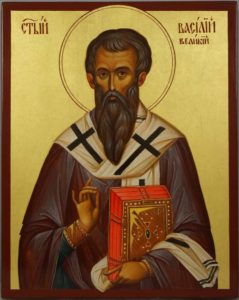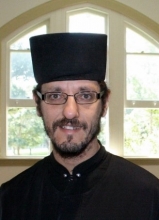Basil of Caesarea by Father Silouan Fotineas
July 12, 2018
Date/Time
Date(s) - 12/07/2018
7:00 pm - 8:45 pm
Location
Online
Categories
Most of the Christians that attend our meetings come from the western tradition. The eastern orthodox churches have many beliefs in common with western churches, but eastern and western Christians tend to operate quite independently. We consider this to be a pity and we are doing our little bit to bridge the divide. Christopher Stabolidis gave a talk on Eastern Orthodoxy in February and Fr Silouan Fotineas graciously fielded questions on the Eastern Orthodox church. He was very well received and we have been keen to invite him back. Thus, our speaker for this coming meeting will be Father Silouan Fotineas. Fr Silouan is the lecturer in patristics at St Andrew’s Greek Orthodox Theological College. He will speak on Basil of Caesarea. Basil was the subject of Fr Silouan’s PhD thesis, so he should know a bit about him.
Well, who was Basil? Basil succeeded Eusebius as bishop of Caesarea in 370 AD. Basil was renowned as an advocate of the Nicene doctrine of the Trinity, but also was a key figure in the establishment of poor houses, hospices, and hospitals, as well as other social activities that are now fundamental social structures within modern societies.
Fr Silouan has provided the following summary of his talk:
The Letters of Bishop Basil of Caesarea: Instruments of Communion
As its title suggest, I will explore the letters of Bishop Basil of Caesarea as instruments of communion. In particular, I will examine how Basil used his letters as instruments for arriving at, maintaining and expressing communion within a pro-Nicene church. For Basil, the divinity of the Father, Son and Holy Spirit was affirmed best through doxological worship and had ecclesiastical communion as its lasting expression. Basil’s letters became the instruments through which he nurtured the fulfilment of his ecclesiological vision of the church as communion. His pastoral and theological message, although often set within an individual and local setting, persistently upheld a social and universal outlook expressed in terms of the church’s communion. He insisted that the most fervent relationship with God involves communion with humans as well. Personal being within the church is intrinsically relational and communal. When Christians are united in communion with God through partaking of the Eucharist in any given worshipping community, they are united without division and without confusion with all believers and across all periods of time.
Basil not only addressed and communicated with people from various walks of life but also became a voice for them as well. Whether letters were addressed to clergy, magistrates, civil or military officials, ascetics, youth, widows, friends or congregations, they found their way to being copied and circulated amongst the faithful and proved to be foundational in bringing into communion the churches of the East. Basil regarded maintaining and expressing communion as of the highest importance for the ministry of the bishop. The act of letter-writing between bishops facilitated their “being in communion” within the Nicene church and, when required, served as proof of this communion through establishing a canon of communion. Amongst Nicene bishops, an affirmation of a creed in writing became the guarantor of a bishop’s communion and a sign of his collegiality with all other bishops. The collective voice of the bishops on issues of faith, doctrine and morals, was essential not only to safeguard the church’s communion but also to enhance its accessibility. As instruments of communion Basil’s letters reveal what he understood as the characteristics of ecclesial communion. I will conclude that key characteristics of communion for Basil are that it be eucharistic, in the Spirit and in Christ, Trinitarian, inspired by the New Testament, traditional, Nicene, episcopal, ascetical, institutional, identifying with the poor, catholic, accessible and safeguarded, mutually responsible, doing God’s will, and beneficial.
Fr Silouan Fotineas graduated from Saint Andrew’s in 2001. In 2002 he was ordained to the priesthood in Brisbane and since 2006 he has been the parish priest of the Holy Monastery of Saint Nectarios in Adelaide. He is currently on the executive council of the South Australian Council of Churches and a board member of the Greek Welfare Centre S.A. His research interests include Patristics, Ecclesiology and Church History of Late Antiquity.



Comment on this article: